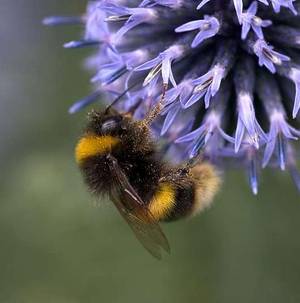Bees prefer insecticide-laced flowers
Interview with
 Bees are essential for food production and, through their pollination efforts, they contribute billions to the world economy. But their numbers have been declining alarmingly in recent years and one reason may be that they are falling victim to a class of insecticides called neonicotinoids. These chemicals get into all parts of a plant - including the nectar that bees collect. But bees should, we were told, avoid plants containing neonicotinoids because the taste would put them off. Now Geraldine Wright, from Newcastle University, has shown that, not only can bees not taste neonicotinoids, they actually alter the insects' brains to make them prefer food laced with the chemicals, so they end up poisoning themselves, as she explained to Chris Smith...
Bees are essential for food production and, through their pollination efforts, they contribute billions to the world economy. But their numbers have been declining alarmingly in recent years and one reason may be that they are falling victim to a class of insecticides called neonicotinoids. These chemicals get into all parts of a plant - including the nectar that bees collect. But bees should, we were told, avoid plants containing neonicotinoids because the taste would put them off. Now Geraldine Wright, from Newcastle University, has shown that, not only can bees not taste neonicotinoids, they actually alter the insects' brains to make them prefer food laced with the chemicals, so they end up poisoning themselves, as she explained to Chris Smith...
Geraldine - This manuscript started out as an experiment to test whether bees could taste neonicotinoids in sucrose solution. We wanted to know whether bees might be able to taste these pesticides and avoid them when they were flying around in the field and possibly foraging on the flowers of seed-treated plants. And basically, the design is to put an individual bumble bee into a plastic box and to put a food tube, one on each side, so that they have one that contains sucrose and another one on the other side that contains sucrose plus a toxin. What we did is we changed to the amount of toxin that we put into the sucrose toxin tube to see at what point the bees would be able to detect the food and avoid the toxin.
Chris - Was your hypothesis then, that because people have said, we don't need to worry so much about some of these insecticides that we put on things because the insects like bees that we want to have around us, they will naturally develop an aversion to the taste of these things and avoid them.
Geraldine - Yes. That's the rationale that a lot of people use, is that these are pesticides. They should taste bad and they should be avoided by insects. So, we wanted to test whether bees could actually detect these compounds in floral nectar and possibly avoid them.
Chris - Can they?
Geraldine - Well, our experiment showed that they cannot in fact taste these pesticides. What's more, using this experimental design, we found that instead, bees prefer to drink solutions that contain 2 of the 3 most common neonicotinoid pesticides.
Chris - Why are they drinking more of the sugar solution if they don't know the stuff is in there and how do you know they don't know the stuff that's in there?
Geraldine - We used a specialised technique that allowed us to record from the bees' taste buds and we applied the neonicotinoids to the bees' taste buds and we couldn't find any evidence that bees could actually taste these compounds using their mouthparts. What I think is happening is that these compounds are acting on the neurons in the bee's brain to make sucrose more rewarding to the bee, just like nicotine affects human beings.
Chris - What would be the consequence for the bee? Would there be something other than just a sort of memory reprograming effect to favour those flowers? Would there be other health deleterious effects?
Geraldine - Yes. So, the unfortunate thing is that the same concentrations that we used which happen to be the concentrations that have been reported from nectar also have been shown to do other things to bees including affecting their motor function, affecting their ability to form olfactory memories, affecting their ability to navigate and find their way home. So, there are detrimental effects of the concentrations that we tested as well.
Chris - There's obviously a lot of attention being paid to the phenomenon of colony collapse disorder which people believe is probably multifactorial. There are lots of elements probably playing a part. Would you say your findings are consistent with these pesticides being involved?
Geraldine - There have been several studies that show that exposure to low doses of these pesticides, specifically imidacloprid, interacts with the bee's immune function and that causes a greater - especially in honeybees - a greater susceptibility to parasites like varroa mites. So, I think that there's good evidence that when you're seeing a situation like colony collapse disorder that it's likely that it could be caused by exposure to the toxin simultaneously with other stressors that also then influence the ability of bees to deal with those forms of stress.
Chris - Geraldine Wright from the University of Newcastle.









Comments
Add a comment